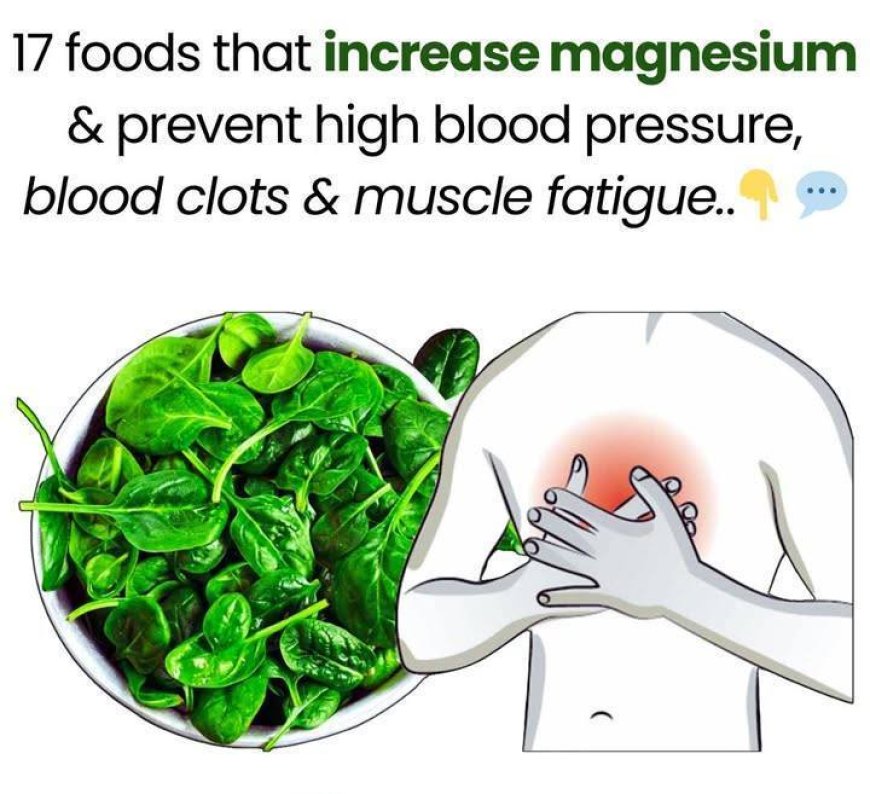17 Foods That Increase Magnesium And Prevent High Blood Pressure, Blood Clots And Muscle Fatigue
2.
17 Foods That Increase Magnesium And Prevent High Blood Pressure, Blood Clots And Muscle Fatigue
The majority of us know the importance of getting enough calcium, vitamin c and protein through our diet, but we tend to forget other crucial vitamins and minerals. Thankfully, magnesium is becoming more and more well-known and appreciated in the medical and nutrition communities.
However, it’s still one of the most common nutritional deficiencies, affecting up to 80% of the American population, and that’s something to be very concerned about.
What is Magnesium Deficiency?
Magnesium is a mineral that is present in relatively large amounts in the body. Researchers estimate that the average person’s body contains about 25 grams of magnesium, and about half of that is in the bones. 1% of it is in your blood.
Magnesium is important in more than 300 chemical reactions that keep the body working properly.
Magnesium is responsible for:
Proper transportation of calcium, silica, vitamin D, vitamin K, and obviously magnesium.
Activating muscles and nerves
Creating energy in the body
Detoxification
Helping digest proteins, carbohydrates, and fats
Serves as building blocks for RNA and DNA synthesis
Acting as a precursor for neurotransmitters like serotonin
Early signs of magnesium deficiency include (1):
Loss of appetite
Nausea
Vomiting
Fatigue and weakness
Numbness
Tingling
Muscle contractions and cramps
Seizures
Personality changes
Abnormal heart rhythms
Coronary spasms
High blood pressure
Blood clots
What Causes Magnesium Deficiency
Modern farming techniques deplete mineral and vitamins from the soil in which your food is grown. This is especially true for fields treated with chemical fertilizers, pesticides, and insecticides.
magnesium depletion in soil
This means that foods grown on these depleted soils do not contain a lot of magnesium.
Certain medical conditions can also make it more difficult for your body to absorb this mineral.
How Chronic Stress Depletes Your Body of Magnesium
The relationship between magnesium and stress is very complex. In one study, it was found that chronically stressed individuals had much lower magnesium levels when compared with control groups. And those who had healthy magnesium levels to begin with showed fewer signs of stress. Basically, stress can lead to magnesium loss in the body, but having more than enough magnesium stores can help protect against stress.
Leo Galland, MD explains the process further: “Chronic stress depletes your body of magnesium. The more stressed you are, the greater the loss of magnesium. The lower your magnesium level to begin with, the more reactive to stress you become and the higher your level of adrenalin in stressful situations. Higher adrenaline causes greater loss
of magnesium from cells. Administering magnesium as a nutritional supplement breaks this vicious cycle by raising blood magnesium levels and buffering the response to stress, building your resistance.”
Risk factors for magnesium deficiency include (2):
Kidney disease
Crohn’s disease or other conditions that affect digestion
Parathyroid problems
Taking antibiotics or drugs for diabetes and cancer
Old age
Abusing alcohol
How To Get More Magnesium
Many people take magnesium supplements, but they don’t always take the right kind.
Small studies have found that magnesium in the aspartate, citrate, lactate, and chloride forms is absorbed more completely and is more bioavailable than magnesium oxide and magnesium sulfate (1).If you do choose to take magnesium supplements, speak to your doctor to make sure that you get adequate levels of calcium, and Vitamins K2 and D3 since these nutrients interact together and improve absorption.
Many foods are fortified with calcium and vitamin D, but you may need to supplement vitamin K2. You doctor should also be able to tell you exactly how much you need and monitor your levels after you begin supplementation.
Here’s how much magnesium you need, according to the National Institutes of Health:
Recommended Dietary Allowances (RDAs) for Magnesium
Age Male Female Pregnancy Lactation
Birth to 6 months 30 mg* 30 mg*
7–12 months 75 mg* 75 mg*
1–3 years 80 mg 80 mg
4–8 years 130 mg 130 mg
9–13 years 240 mg 240 mg
14–18 years 410 mg 360 mg 400 mg 360 mg
19–30 years 400 mg 310 mg 350 mg 310 mg
31–50 years 420 mg 320 mg 360 mg 320 mg
51+ years 420 mg 320 mg
*Adequate Intake (AI)
Regular Epsom salt baths or foot baths are also a great way get more magnesium since it can be absorbed through your skin. You can also apply magnesium oil on your body if you dislike baths.
First and foremost, the best way to up your magnesium levels is to change your diet to include more magnesium-rich foods.
Komplettes Rezept im Kommentar


























